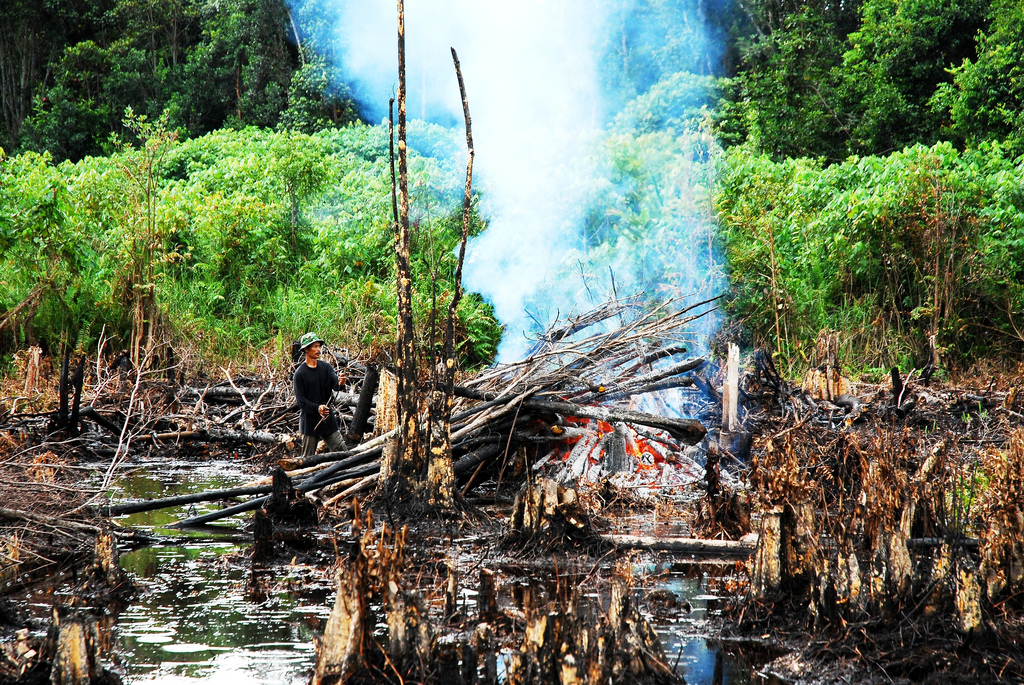Indonesia’s forest fires show we need to talk about palm oil
by Ben Morris
11 November 2015

The culpability of big business in colossal environmental disasters is an exasperatingly recurrent theme. In our era of globalized consumer capitalism, environmental degradation is a necessary by-product of the demand for natural resources that fuels the means of mass production.
Often this relationship is so stark it is symbolized in the name of the tragedy itself, such as the Sandoz chemical spill in 1986, a fire which released airborne toxic agrochemicals turning the Rhine red with pollutants. Or the Exxon Valdez oil spill of 1989, which dispersed 11m gallons of crude oil into Alaskan waters, killing over half a million birds and from which some species, such as orca whales and sea lions, have still not fully recovered more than 26 years later. Similarly, the Deepwater Horizon (BP) oil spill, thought to have been responsible for the deaths of 65k turtles, devastating endangered species such as the brown pelican and having a lasting effect on dolphin and whale populations throughout the Gulf of Mexico.
The link between big business and environmental disaster is unequivocal. Yet the ongoing Indonesian forest fires are not being referred to as the PepsiCo or Starbucks forest fires. This lack of an eponymous title – due to the fire-starters being third-party suppliers – places greater responsibility on the media to highlight those companies responsible. However, save for a handful of articles in the left-leaning broadsheets, the issue has largely been ignored by British mainstream media.
Right now, much of Indonesia’s forest and carbon-rich peatland areas of Kalimantan and Sumatra are in flames. The fires are suspected to have been illegally started to prepare land for pulpwood and palm oil production. World Resources Institute (WRI) data suggests the vast majority of the fires detected on Sumatra – home to over 50m people – can be traced to palm oil plantations, a product that is ubiquitous throughout the global food and cosmetics industries.
On 10 October WRI estimated the daily carbon emissions of the fires were exceeding those of the entire US economy, potentially causing respiratory problems in half a million people. One-third of the world’s orangutan population is at risk. The Sumatran tiger, a species estimated to have fewer than 400 still living in the wild, is also gravely threatened, as are the Javan and Sumatran rhinos, which are thought to number fewer than 60 and 100 respectively. Other dire and lasting consequences will result from the fires aside from the habitat destruction and the flames themselves; smoke inhalation has an impact on Gibbon monkeys’ territorial ‘singing’, inhibiting their ability to reproduce normally. Littered with biological complexity, it is a tragedy on an unprecedented scale.
Although several corporate executives have been arrested for their suspected role in starting the fires, punitive measures are not the long-term solution. Some have advocated the introduction of government measures in Indonesia that would review corporate land concessions and regulate more stringently the companies involved in the palm oil and wood industries. Yet questions of administrative corruption abound, and apart from being difficult to enforce, the transnational nature of the corporations involved means provincial or state-wide legislative reform would merely have the effect of uprooting the practices currently wreaking untold damage and seeing them implemented elsewhere in the world. The solution must be to confront the rapacious profiteering driving so much of the agribusiness industry, and as such, the importance of a global civil action movement cannot be overstated.
The forthcoming UN Conference on Climate Change in Paris (aka COP21) may be fruitful. The recent proposals to formulate a new Business and Human Rights Treaty to pressure transnational corporations into operating more ethically are also significant, but problematic for two main reasons. First, such resolutions are subject to veto by powerful countries with strong corporate lobbies and logistically tricky to push through the bureaucratic, clunky apparatus of the UN. Second, the enforcement of such a resolution is conditional upon multiple variables in which legal departments of large corporations are bound to eventually establish loopholes.
Palm oil has become an integral part of the human food chain, given its inexpensiveness and high-yield. The ever-increasing human population means the ethical production of palm oil is of increasing consequence. Yet companies which profess adherence to eco-friendly schemes such as the ‘zero-burning’ policy do so in the knowledge that it is almost impossible to trace the illegalities to source.
To wait for agribusiness to correct its own malpractice is counter-productive, since it is contingent on a level of delay that the environment can’t afford. Pertinently, experience suggests pressure from the consumer can pay dividends. Campaigns such as Say No to Palm Oil are advocating lobbies and boycotts, facilitated by apps designed to help people avoid palm oil, and the cosmetic chain Lush is now palm-oil free, having been impelled by numerous customers to scrutinize its lack of sustainability. With a concerted effort, the consumer can affect the producer.
Photo: Ryan Woo/CIFOR/Flickr
–
If you want to support media for a different politics, you can donate or subscribe to Novara Media at support.novaramedia.com.